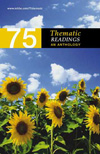
Edward O. Wilson |  |
Edward O. WilsonEdward O. Wilson, "Is Humanity Suicidal?" Edward O. Wilson (1929- ) was born in Birmingham, Alabama and earned
both a B.S. (1949) and an M.S. (1950) from the University of Alabama,
and a Ph.D. from Harvard University in 1955. Wilson's taught entomology
and biology at Harvard for more than forty years. His books include The
Insect Societies (1971), On Human Nature (1978), The Ants
(1990), which he co-wrote with Bert Hölldobler, and The Future
of Life (2002). Wilson's also a frequent contributor to journals such
as Systematic Zoology, Ecology, and Nature. Among
many awards and honors, Wilson has won the National Medal of Science and
two Pulitzer Prizes (for On Human Nature and for The Ants).
"Is Humanity Suicidal?" is a stark look at what we're currently
doing to the earth. It was first published in the NewYorkTimes in 1993 and reprinted in In Search of Nature (1996). | QUESTIONS FOR DISCUSSION | CONTENT - Explain the "juggernaut theory of human nature."
- What negative hereditary traits of human beings does the author
mention?
- Define the words fecund and androcentric.
- Name the two schools concerned with the fate of human beings that
Wilson discusses.
- Where is one area the author points to as having a high birth rate?
- List some examples of things scientists don't know about
our biosphere.
- With what imaginary scenario does Wilson begin his essay? Where
does the scenario take place? What time period does it cover? What is
"the Moment"?
STRATEGY AND STYLE - In paragraph twenty-six Wilson compares the size of the rain forests
to the U.S. and the amount they are shrinking to the state of Florida.
How might such comparisons help a non-scientist understand a scientific
piece? Where else in the essay does he do similar things?
- Review your answer to Content question g.) above. Into what special
position does Wilson put the observers from Jupiter? How would this
position change if they were, say, earthling scientists? What does he
gain by employing this literary device?
- The author makes mention of his tone of voice in paragraph seventeen.
What, specifically, in the preceding three paragraphs, is different
about his tone when discussing the exemptionalists as compared to the
environmentalists? What effect does the questioning in paragraph fourteen
have on his introduction of the former group?
- Where, exactly, does the author answer the question posed in the
title? What do you make of this placement?
- Wilson compares putting the biosphere back together to something
else in paragraph thirty-two. Complete the comparison. How can you tie
in this mental image to his thoughts about the relationship
of humanity to the environment?
| ENGAGING THE TEXT | - Recall a movie you've seen in which the fate of the earth was threatened—by
asteroids, by dinosaurs, by space invaders, or something else—but the
heroes managed to defeat the threat. How did they do it? How can you
link these images to the scenarios in your text?
- How comfortable are you reading about science? How about ecology
in particular? How did your comfort level in this area affect your reading
here?
| SUGGESTIONS FOR SUSTAINED WRITING | - Review your answer to Content question d.) above. If you had to
pick one, would you say you fell into the exemptionalism camp or the
environmentalism camp? Write an essay describing yourself, linking your
thoughts to your reading, and making clear why you picked one side and
not the other.
- Wilson describes a "myopic fog," a survival advantage
passed on to us from the hunter-gatherers that encourages focusing on
the present and only the recent past and near future. Write an essay
that details two important ramifications on the environment of such
an inherited trait and what we might be able to do about them.
| FOR FURTHER RESEARCH | Review Wilson's comments about the population of Nigeria in paragraph
ten. How close is the population of that country right now to prediction
he gives for 2010. Is the country on track to reach 216 million people
by then? Research the country's recent history to explain any discrepancies. | WEB CONNECTION | This is the homepage
of Harvard's Department of Entomology's Museum of Comparative Zoology,
with which Wilson has had a close relationship over the years. Here you
can browse historical collections and search a database. | LINKS | Biographical This interview
with Wilson at Salon.com contains lots of biographical information and
a photo. The Alabama Academy of Honor prepared this biographical
sketch of Wilson when he was inducted there in 1995. This page
has a brief biography, a photo of Wilson, and a picture of the book
cover of In Search of Nature.
Bibliographical "The Biological Basis of Morality" is the title of this
etext essay
that Wilson wrote for The Atlantic magazine in 1998. Wilson gave this interview
following the publication of his book, Consilience: The Unity of
Knowledge. This page also has a link to the excerpt of the book. How about some multimedia? Take a look at this slide
show by Wilson about the extinction of ancient forests, given at
the U.S. Capitol in 1998.
Cultural This page
contains the citation for Wilson's Pulitzer Prize, which he won in 1991
for The Ants. Do you recognize any of the other names there?
How would you find out more about them? Do you like bugs, or do you just squish them? If you'd like to
know more about them, visit bugbios.com,
an "entomological database of very cool bugs." Has reading Wilson's work fostered an interest in researching the
field of sociobiology? You should take a look at this directory
on the topic at Google.com. Guess whose name is featured prominently?
|
|
|
|